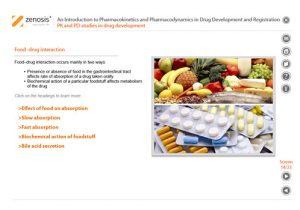An Introduction to Pharmacokinetics and Pharmacodynamics in Drug Development and Registration
Course Summary
Pharmacokinetic (PK) and pharmacodynamic (PD) studies provide a bridge between science and medicine in the development of a drug. In this module we describe the role of in-vivo PK and PD studies in a drug development programme, set out the uses to which the findings can be put, and discuss their implications for clinical development and application for marketing approval.

£74.00 Original price was: £74.00.£49.00Current price is: £49.00. exc. VAT
Purchasing Information
When you have completed your course order, Zenosis will finalise the setup of your course materials and contact you on the email address that you provide in your order. You can expect this process to be completed within one business day (using the UK business calendar) of completing your payment.
It is therefore essential that you use your real email address for your order, or indicate in the purchase notes the email address to be used for the course set-up, and check that any messages from Zenosis or grapl are not lost in your junk or spam folder.
You will have access to the course module(s) for a period of 180 days after your purchase is complete.
Detailed Course Information
• Describe the role of pharmacokinetics and pharmacodynamics in drug development and registration
• Identify the main types of pharmacokinetic and pharmacodynamic studies conducted during drug development, their goals, and the uses of the data obtained
• Outline the pharmacokinetic characteristics of the various routes of drug administration
• Discuss how in-vivo pharmacodynamic studies provide a bridge between science and medicine in drug development and registration
Pharmacologists, nonclinical researchers, clinical researchers, regulatory affairs staff, and others who contribute to drug development and registration will benefit from this module.
• Module overview
– An outline of the module’s scope and objectives, and notes on terminology.
• Role of pharmacokinetics and pharmacodynamics
– Although pharmacokinetic (PK) and pharmacodynamic (PD) studies are routinely carried out in nonclinical and clinical stages of drug development, their role is perhaps less well understood than it ought to be by those who are not specialists in the field. In addition, greater emphasis is being placed by regulators on the value of PK and PD data. Evidence of good practice in the execution of PK and PD studies, and sound understanding of the implications of their findings, are becoming increasingly important in drug registration. In this session we define PK and PD, outline the uses of PK and PD data in a drug development programme, and give examples of how good practice in obtaining and interpreting PK and PD data can contribute to the minimisation of risk for a drug.
• PK and PD studies in drug development
– In this session we discuss the various types of study carried out to acquire pharmacokinetic and pharmacodynamic data, grouping them into those conducted in animals only, in animals and humans, and in humans only. We identify their goals, rationale, and place in a drug development programme.
• Drug administration routes
– In this session, after introducing the principal pharmacokinetic parameters, we describe the PK and PK/PD characteristics of each drug administration route. We discuss the different medical-scientific questions to be addressed by PK/PD research for the different routes.
• Pharmacodynamic studies
– In this session we discuss the scope of pharmacodynamics, distinguish pharmacodynamic from clinical outcomes, and outline how the former may be used as surrogates for the latter. The core information from PD studies is a quantitative description of the dose–response relationship and the influence of various factors on this relationship. We emphasise the importance of interpreting the shape of the dose–response curve in making major decisions on a drug’s development. Finally, we discuss factors that can influence the beneficial and adverse effects of a drug.
• Assessment
– Multiple-choice mastery assessment.
